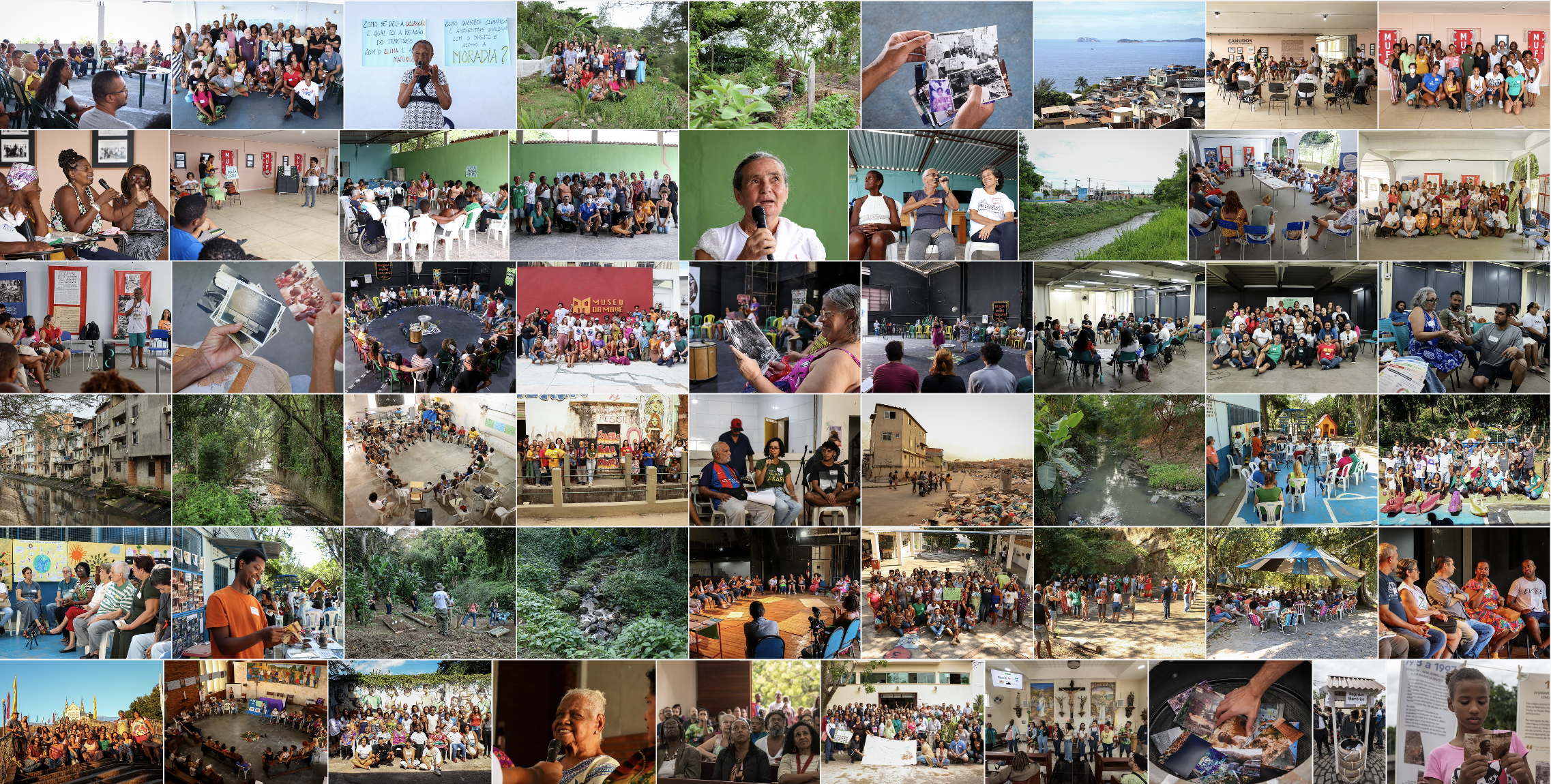
The Relationship Between Rio de Janeiro’s Favelas, Climate and Nature is the Theme of the Complete ‘Favela Climate Memory’ Exhibition, Bringing an Extensive Timeline, Unprecedented Data and Unique Testimonials From 10 Favelas—Including the City’s Three Largest—to the Public [PDF Version]
After over three years in the making, this Saturday, May 3, 2025, marks the much-anticipated launch of the ‘Favela Climate Memory’ exhibition in full. Informed by 1,145 testimonials from 10 favelas and organized by eleven favela museums and memory collectives that are part of the Sustainable Favela Network, the exhibition will be open to the general public at the Maré Museum, with visitation open through July 30. Running from 8:30am to 5pm, the event will feature an official opening ceremony with talks from organizers and participants, banners, videos, a timeline, a memory well, an interactive map, an environmental skit, a tent with activities for kids, and more.
April 30, 2025 — On the weekend that kicks off Brazil’s Museums Month, Rio de Janeiro’s Sustainable Favela Network will launch the complete ‘Favela Climate Memory’ exhibition on Saturday, May 3, at the Maré Museum. The Favela Climate Memory project brings together testimonials and unprecedented historical data about the relationship of 10 favelas with climate and nature. The project represents a crucial leap forward, aiming to foster the understanding needed to achieve the long-awaited effective integration and true sustainable development of Rio de Janeiro, the complex city we call home.
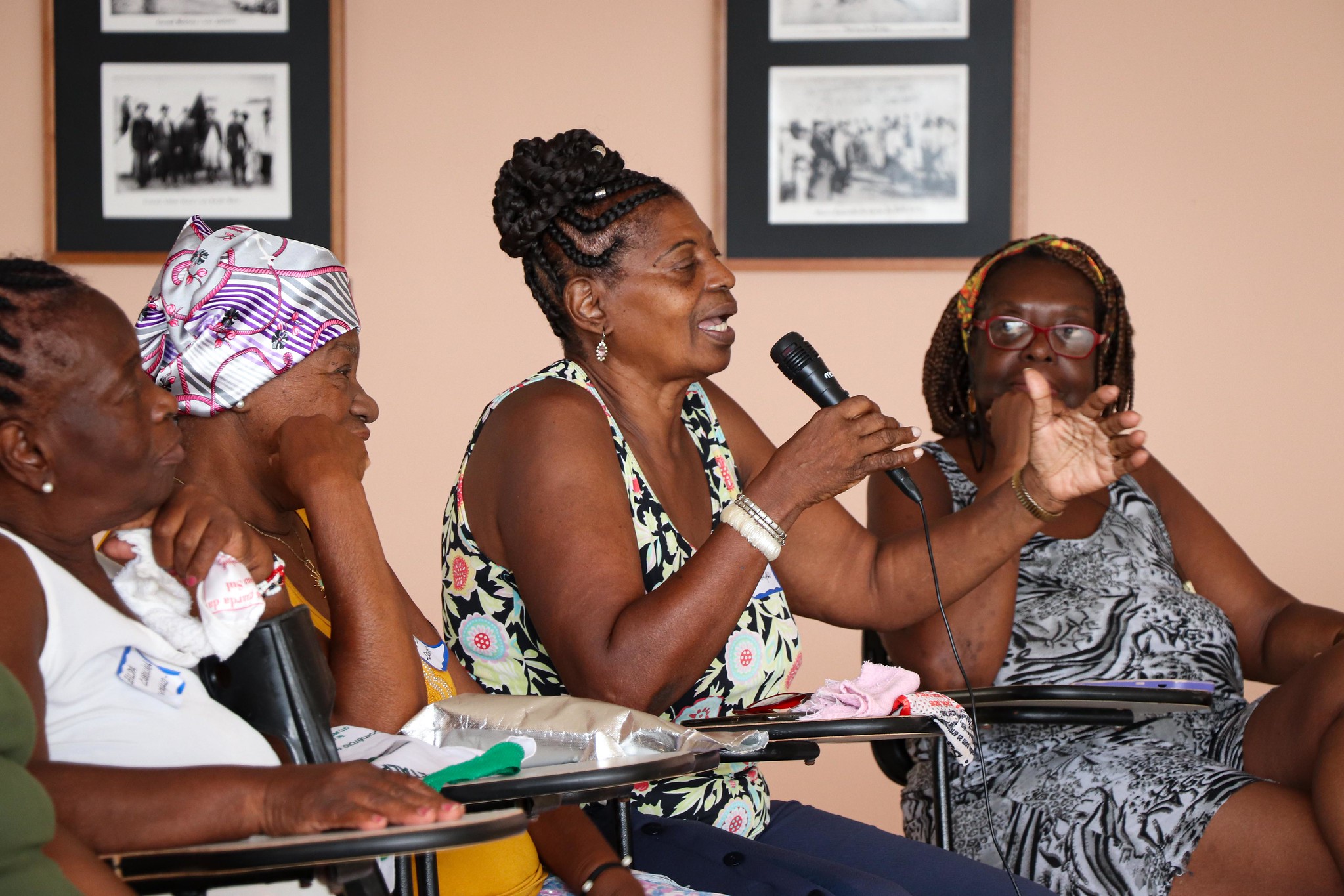
Representing the three largest favelas in the city (Rocinha, Rio das Pedras and Maré), favelas marked by severe climate impacts (Acari, Vidigal and Pavão-Pavãozinho/Cantagalo), others that became destinations for climate-displaced populations (Antares and City of God), and communities with projects that are exemplary examples of coexistence with nature (Horto and Penha), the exhibition resulted from 1,145 testimonials shared by 382 participants of climate memory discussion circles held across these 10 favelas throughout 2023 and 2024.
“I remember well that during the 1996 rains, my family was hugely affected. My family lives very close to the river, and at my aunt’s house, the whole wall collapsed. She was swept away and was saved by a group of neighbors who were working together to rescue people… My uncle was one of them, because he was 1.9 meters (6.2 feet) tall… He stayed in the water helping people—my Uncle Adão. Shortly after, he caught leptospirosis and passed away… Another neighbor who also helped rescue people drank that water and also died of leptospirosis… And then a large group of people were left psychologically affected.” — Priscila da Silva Pereira, City of God Climate Memory Circle, April 2024
Launch Day Program
The free, public exhibition launch event will take place from 8:30am to 5pm on May 3. The official opening will feature talks by organizers and participants in the climate memory circles, in the morning. It will be the Sustainable Favela Network’s largest public event of the semester, and one of the biggest in its history.
The event will feature an exhibition circuit with banners presenting the climate memory circles held in each location, screening of a minidoc documenting residents’ reflections on climate change, an extensive timeline showcasing 60 key events in the climate history of Rio de Janeiro’s favelas, a “memory well” installation with photo memories, an interactive map offering a personal cartographic experience, an environmental skit and other performances by youth from Maré, and a tent with activities for children.
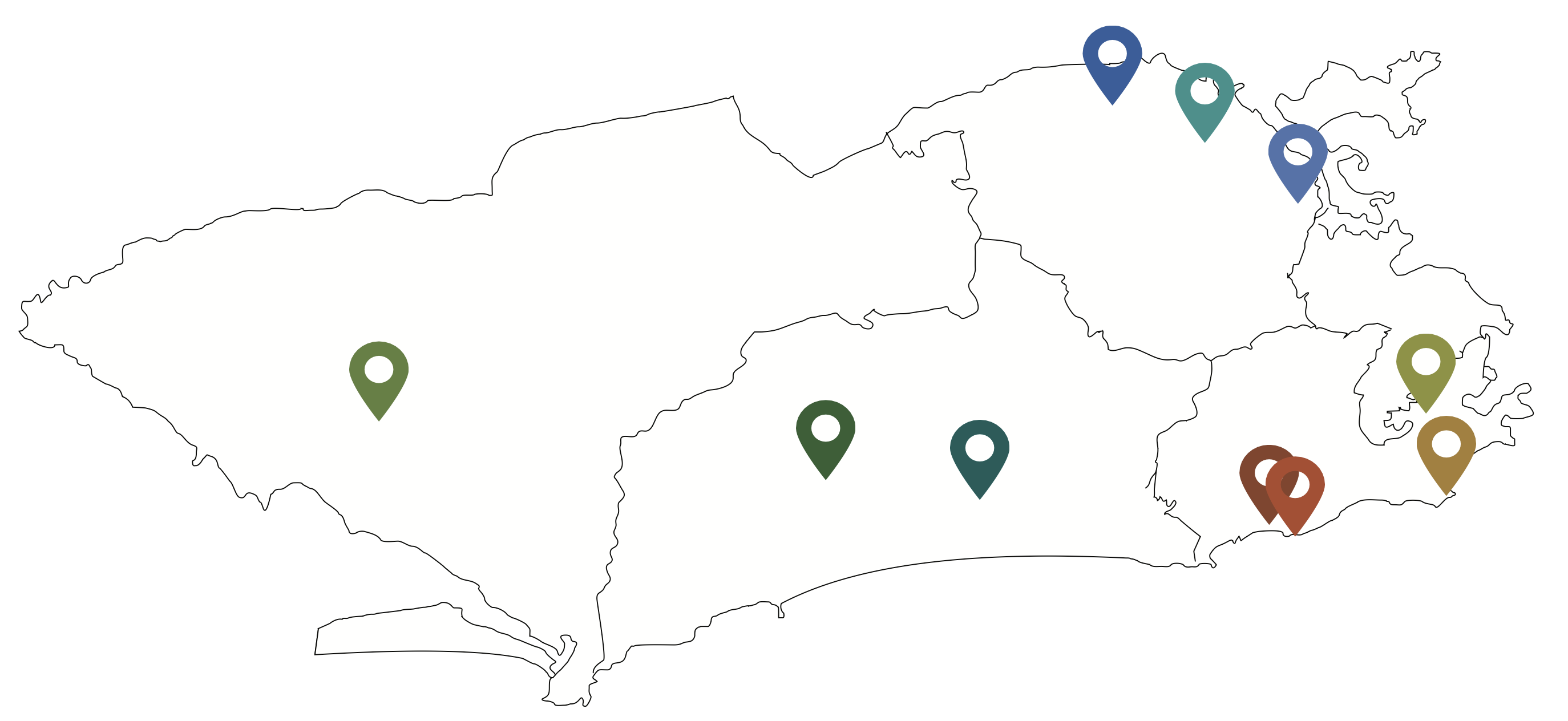
The exhibition will remain open for visitation until July 30 at the Maré Museum, which hosted the inaugural climate memory circle in the Maré favela two years ago. The exhibition brings together knowledge recorded during memory circles held by: the Sankofa Museum (Rocinha favela), the Historic Orientation and Research Nucleus of Santa Cruz (Antares favela), the Favela Museum (Pavão-Pavãozinho/Cantagalo favela); the Vidigal Memories Nucleus (Vidigal favela); Alfazendo (City of God favela); the Serra da Misericórdia Integration Center (Complexo da Penha favela); the Horto Museum (Horto favela); Fala Akari (Acari favela); and Conexões Periféricas (Rio das Pedras favela).
“What we can do today is to not forget, and never give up.” — Márcia Souza (Favela Museum)
The May 3 launch will be the only event during this landmark exhibition featuring all of the project organizers together. Don’t miss their presentations during the morning’s opening ceremony!
“We remember, and we must share our memories! To protect our lives, our relationship with nature and future generations.” — Lidiane Santos (Alfazendo/City of God)
How It All Started
The idea of documenting ‘favela climate memory’ surfaced within the Sustainable Favela Network’s Local Culture and Memory Working Group, in 2021. The goal was to retrieve and document the memories and stories held by long-time favela residents about the climate, in order to identify ways to better prepare for climate changes to come. Traditionally, this topic has rarely been addressed, even though, as the experiences shared during the circles revealed, it has always been a significant part of daily life in the favelas.
“When I came here, there were just shacks, no brick and mortar homes. There was no electricity, no paved streets, no sewerage. In short, to get around, we had to lay down wooden boards. We had to leave the house carrying our bags and shoes in our hands [so they wouldn’t get dirty in the mud].” — Izanete Bernardo da Silva, Acari Climate Memory Circle, August 2024
Over the course of over 50 meetings, ten full-day discussion circles, and several partial exhibitions held between 2022 and 2024, the Favela Climate Memory project and exhibition were developed.
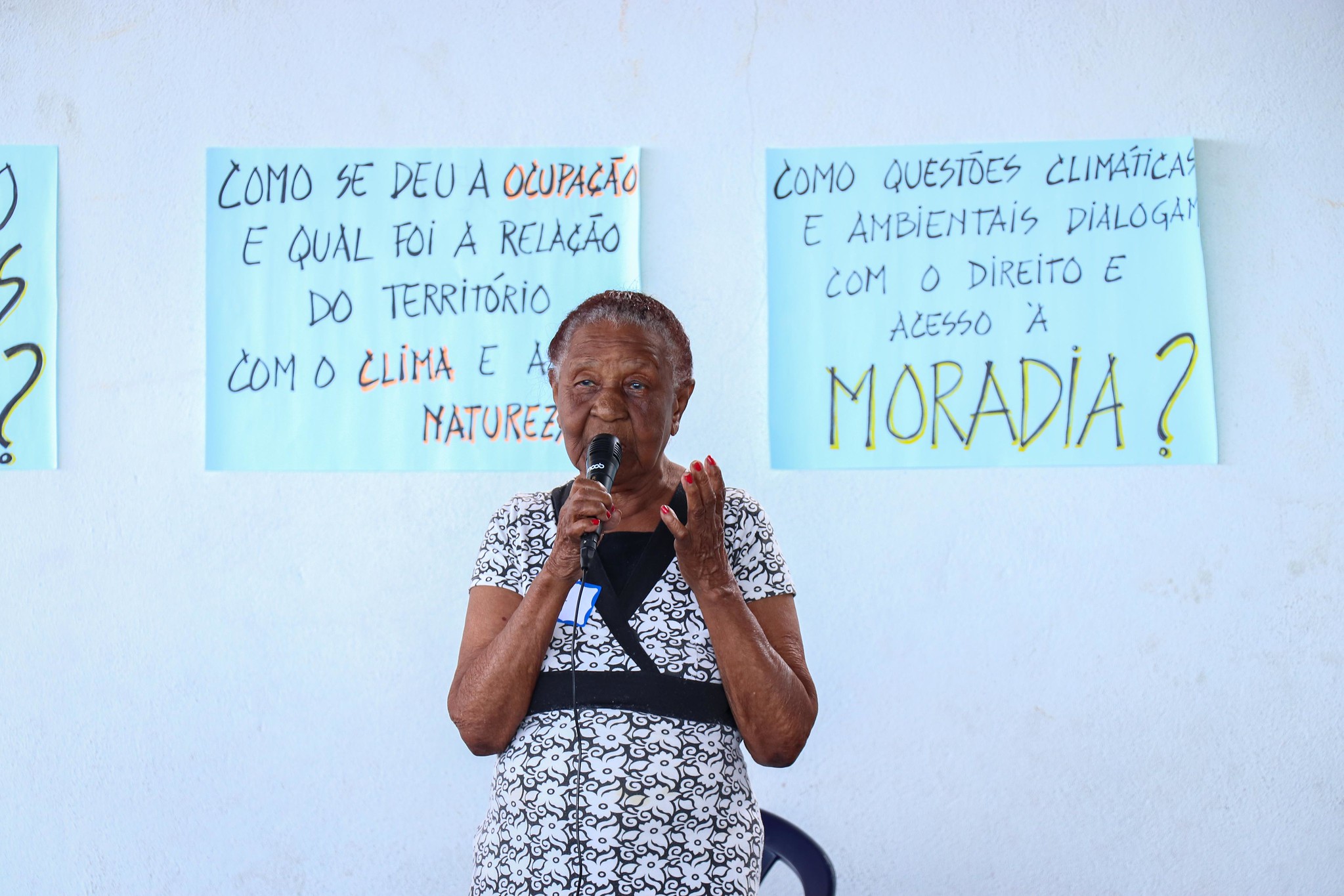
Drawing from the knowledge produced and recorded during discussion circles with the participation of 382 residents, held in ten of Rio’s favelas between 2023 and 2024, the final exhibition demonstrates the importance of the memories that shape the lived experiences of these residents. It aims to generate a future characterized by the realization of rights, climate resilience, human flourishing and valuing of the ancestral knowledge of these territories. The exhibition brings forth unexpected knowledge and positions favelas as central to the discussions on climate change and the future we want to achieve.
The discussion circle format—‘focus group’ in social science terminology—was chosen not only for its high effectiveness in eliciting information as a research tool, but also for its role as a space for local empowerment through the collective construction of knowledge and mutual understanding.
Four guiding questions shaped the reflections during these gatherings:
- How was the area settled and what is the favela’s relationship with the climate and nature?
- What is climate change to you and in the eyes of your community?
- How does climate relate to housing rights?
- What knowledge has the community developed to respond to the challenges posed by nature and climate?
The climate memory circles held in these ten favelas were spaces for powerful testimonials. Always beginning with the residents’ relationship with nature, the circles brought forth a wide range of memories—marked by both tenderness and struggle. Even though many of the statements shared painful experiences, within the circle, that pain was reworked into a driving force for social transformation and empowerment.
“We need our solutions to be thought up by us, because if someone [from outside] comes in [with] the solution, they won’t have a real connection to the place. They won’t have the same sense of belonging. For them, it’s just a plastic solution they would offer anywhere else.” — Vilson Luiz, Complexo da Penha Climate Memory Circle
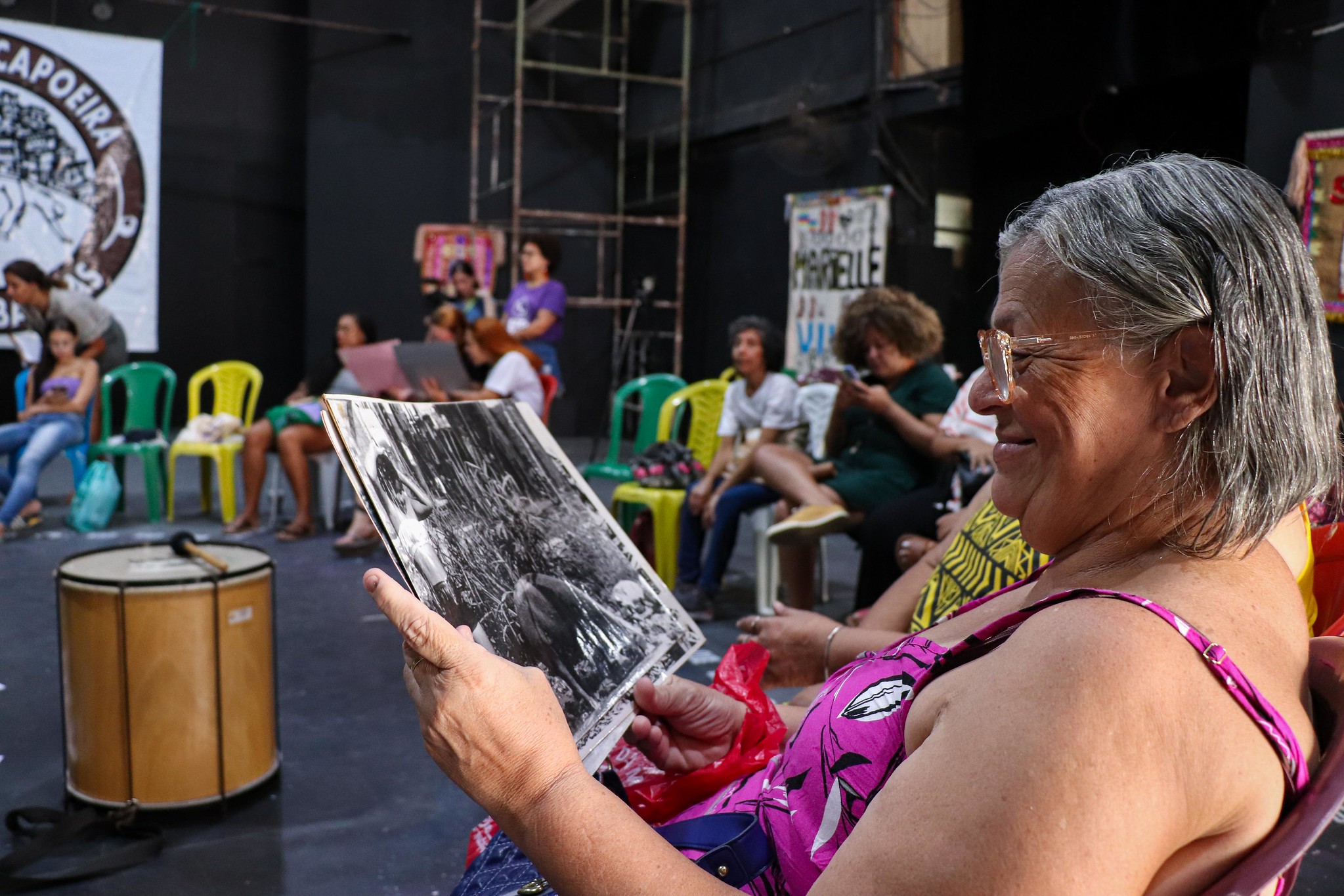
During the circles, residents exchanged perspectives on their lived experiences and observations on climate change, recalled memories about the relationship between how their communities were settled and nature and climate, discussed how climate issues relate to the realization of the right to housing, and addressed the solutions and mobilizations developed by residents themselves, highlighting the misguided priorities of the State, which tends to view forced evictions as the solution.
“We had no water. We only had water from a spout. We fought for it, and got water. We got electricity. Through our struggle, we make things happen—not by standing still… We’re nothing without fighting.” — Eufrosina A. da Silva, Antares Climate Memory Circle
Together, drawing from the life experiences and data gathered, the Sustainable Favela Network’s social museology collectives designed an exhibition to bring light and voice to the discoveries made during the circles, inviting the public to reflect on the plurality and deep interconnectedness of the climate memories of the favelas.
There emerged the proposal for a richly detailed timeline with colorful panels representing key dates identified during the circles, banners highlighting powerful statements from residents in each circle, a mini documentary weaving together testimonials from various favelas around the key themes discussed, the deeply moving “well of memories” installation featuring nearly 300 photographs from the participating communities, and a hand-stitched interactive map where visitors can share their own memories. The well of memories and map were produced by artisans from Vidigal (Evânia de Paula) and Maré (Marli Damasceno), both active members of the project.
“I had my house destroyed by a flood… Our memories are memories of pain, but also of re-signification and struggle. When we talk about climate change, I think a lot about our re-signification, our struggle, but also about the unity, about people who come together so that we can move forward as one.” — Michelle Dias Lacerda, Rocinha Climate Memory Circle
While developing the project over the past couple of years, the participating collectives have been invited to present the work at several events, including the Opening of the Urban and Regional Planning and Research Institute’s (IPPUR) 2024 Week, the 2024 MAST Colloquia, the #MusaForum16 organized by the MINA (Insurgent Museologies in Our America) Study Group, and the 19th International Conference on Community-Based Adaptation to Climate Change (CBA19), also this month, in Recife.
About the Participating Collectives
The social museology collectives, members of the Sustainable Favela Network, that led the Favela Climate Memory project represent favelas from all of Rio de Janeiro’s current municipal planning areas. Learn more about them:
- North Zone: Maré Museum (Maré), Serra da Misericórdia Integration Center (Complexo da Penha), Fala Akari (Acari)
- West Zone: Historic Orientation and Research Nucleus of Santa Cruz (NOPH) (Antares), Alfazendo (City of God), Conexões Periféricas (Rio das Pedras)
- South Zone: Sankofa Museum (Rocinha), Favela Museum (Pavão-Pavãozinho/Cantagalo), Vidigal Memories Nucleus (Vidigal), Horto Museum (Horto)
“Social museology gives us, favela residents, the opportunity to tell our own story!” — Maria da Penha Macena (Evictions Museum)
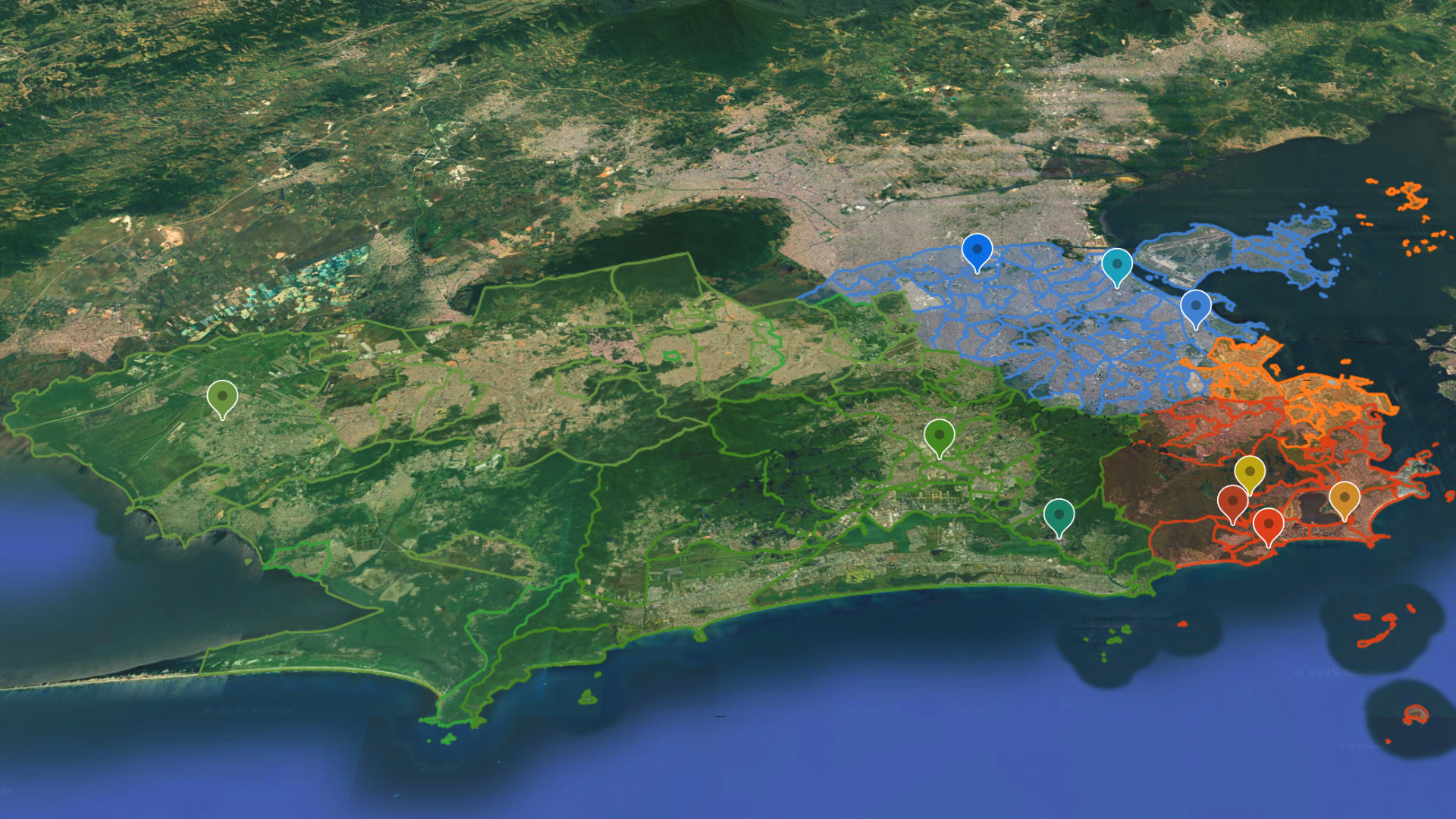
The launch will also include participants from the following favelas: 4 Bicas, Arará, Barros Filhos, Cinco Bocas (Brás de Pina), Complexo da Pedreira, Complexo do Alemão, Comunidade Indiana Tijuca, Conjunto Bento Ribeiro Dantas, Conjunto Esperança, Coreia, Fallet, Favelinha das Almas, Fazenda Botafogo, Final Feliz (Complexo do Chapadão), Furquim Mendes, Gardênia Azul, Itacolomi, Jacarezinho, Manguinhos, Morro da Providência, Morro dos Macacos, Nova Campinas (Duque de Caxias), Pereirão, Salsa e Merengue, São Carlos, Senador Camará/Morro do Céu, Sereno, Tabajaras, Vaz Lobo and Vila Cruzeiro.
About the Sustainable Favela Network
The Sustainable Favela Network (SFN) is made up of 994 members, including community organizers from over 300 favelas and technical allies, with 70% of its members being Black and 66% women. In total, over 4,000 people have participated in Sustainable Favela Network activities in person. Together, we fight for climate justice, aiming to realize the potential of favelas as sustainable communities through 11 key areas: Climate Justice, Socio-Environmental Education, Participatory Policymaking, Local Culture and Memory, Food Sovereignty, Collective Health, Solidarity Economy, Right to Sanitation, Energy Justice, Just Transport, and Sustainable Housing. We strive to foster and enhance the qualities that already exist in favelas to boost, realize, and amplify their potential. The SFN operates from the perspective of favelas as sources of solutions, including for human sustainability, based on the concept of Asset-Based Community Development (ABCD), which focuses on developing residents and territories according to their strengths. Click to learn more about the network. The Sustainable Favela Network’s managing organization is Catalytic Communities (CatComm), winner of the Brazilian Federation of Architects and Urban Planners (FNA) award in 2022, among other honors, for its work since 2000 in providing strategic support to favela organizers across Greater Rio.
Project Sponsors
The Favela Climate Memory project is carried out by the Sustainable Favela Network with support from the ClimateWorks Foundation, Instituto Clima e Sociedade (iCS), re:arc institute, and Përɨsɨ: Laboratory of Ecology, Knowledge, and Democracy/UFF.
Event Details
Launch of the Complete ‘Favela Climate Memory’ Exhibition at the Maré Museum on May 3, 2025:
Date: May 3, 2025 (Saturday)
Time: 8:30am – 5:00pm
Location: Maré Museum – Av. Guilherme Maxwell, 26 – Maré, Rio de Janeiro – RJ, 21040-212
Google Maps: https://maps.app.goo.gl/GzmiAFrcsfDewC6e6
Contact
- International/English: +55-21-991976444
- Email: press@catcomm.org
- Instagram: www.instagram.com/favelasustentavel
Press Support Materials
Exhibition Invitation Flyer [in Portuguese]
Video footage [free to use, provided it is for coverage of this topic and with attribution to the Sustainable Favela Network]
- Full Mini-doc: Favela Climate Memory
- Deep Dive: Complexo da Penha Climate Memory Circle
- Partial Exhibition Launch, 2023
Photographs [free to use, provided it is for coverage of this topic and with attribution to the Sustainable Favela Network/CatComm]
- PHOTO ALBUM of the building of the ‘Favela Climate Memory’ Exhibition
- Images from the Favela Climate Memory circles: Maré | Rocinha | Antares | Pavão-Pavãozinho/Cantagalo | Vidigal | City of God | Complexo da Penha | Horto | Acari | Rio das Pedras
- Images from prior partial exhibitions:
-
- Evictions Museum, Vila Autódromo
- Historic Orientation and Research Nucleus of Santa Cruz (NOPH), Santa Cruz
- Center for Studies and Solidarity Actions of Maré (CEASM), Maré
- Favela Museum, Pavão-Pavãozinho/Cantagalo
- Sankofa Museum, Rocinha
- Urban and Regional Planning and Research Institute (IPPUR), Federal University of Rio de Janeiro (UFRJ)
-
Learn more about the Sustainable Favela Network
Photo Album Showing the Building of the ‘Favela Climate Memory’ Exhibition:
*The Sustainable Favela Network (SFN) and RioOnWatch are both projects of Catalytic Communities.


